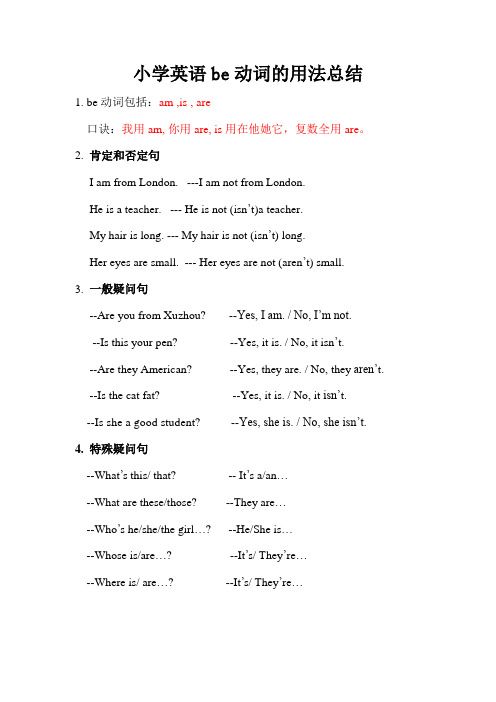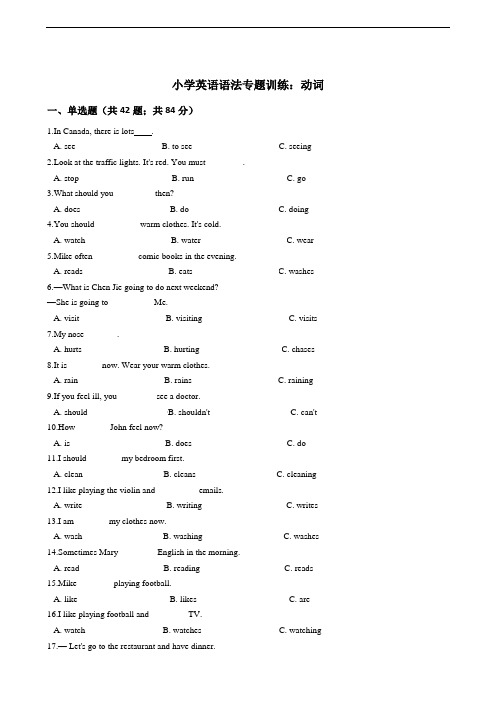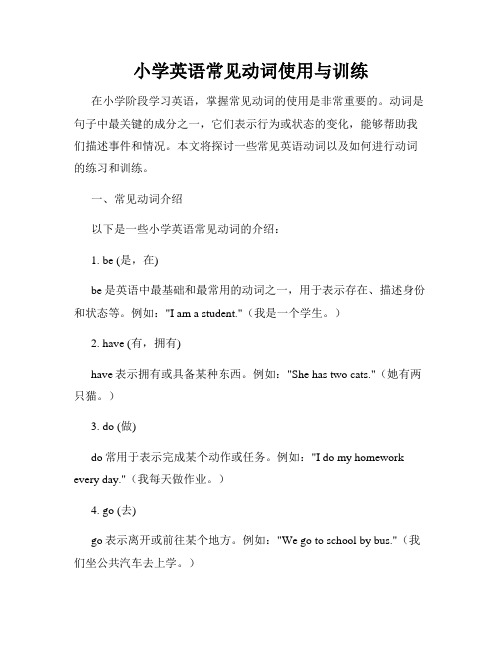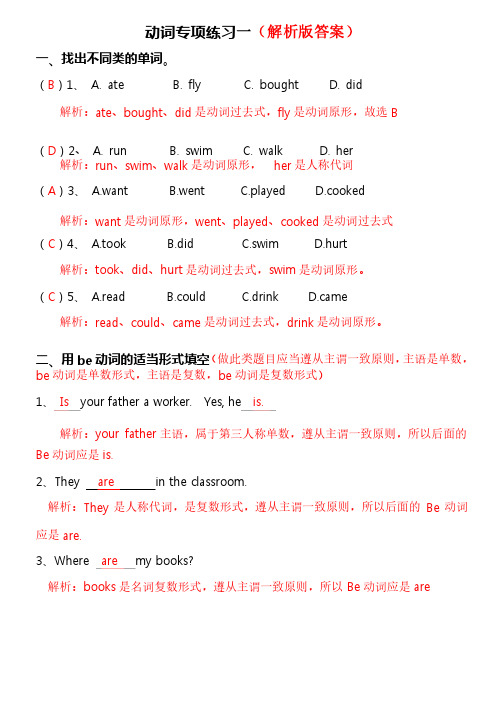小学英语动词及专项训练.doc
小学英语be动词的用法总结及练习题

小学英语be动词的用法总结1. be动词包括:am ,is , are口诀:我用am, 你用are, is用在他她它,复数全用are。
2. 肯定和否定句I am from London. ---I am not from London.He is a teacher. --- He is not (isn’t)a teacher.My hair is long. --- My hair is not (isn’t) long.Her eyes are small. --- Her eyes are not (aren’t) small.3. 一般疑问句--Are you from Xuzhou? --Yes, I am. / No, I’m not.--Is this your pen? --Yes, it is. / No, it isn’t.--Are they American? --Yes, they are. / No, they aren’t. --Is the cat fat? --Yes, it is. / No, it isn’t.--Is she a good student? --Yes, she is. / No, she isn’t.4. 特殊疑问句--What’s this/ that? -- It’s a/an…--What are these/those? --They are…--Who’s he/she/the girl…? --He/She is…--Whose is/are…? --It’s/ They’re…--Where is/ are…? --It’s/ They’re…小学英语be动词练习一、用恰当的be动词填空1. I ______ a boy. ______ you a boy? No, I _____ not.2. ______ David and Helen from England?3. The dog _______ tall and fat.4. You, he and I ______ from China.5. ______ your brother in the classroom?6. --Where _____ your mother? --She ______ at home.7. How _______ your father?8. Mike and Liu Tao ______ at school.9. Whose dress ______ this?10. Whose socks ______ they?11. Here _____ a cake for you.12. Here ______ some oranges for you.二、句型转换1. Our school is beautiful.否定句:______________________________________ 一般疑问句:__________________________________ 2. The bike is behind the tree.否定句:______________________________________ 一般疑问句:__________________________________ 对划线部分提问:__________________________。
小学英语名词、动词、形容词专项讲解及练习Word编辑

名词、动词、形容词一.名词 (n.)1.定义名词是表示人或事物名称的词。
它既可以表示具体的东西,也可以是表示抽象的东西。
名词分为可数名词和不可数名词。
可数名词分为单数和复数。
2.名词分为可数名词和不可数名词。
可数名词——可以数的名词不可数名词——数不清(没有复数)drink? milk tea water coke coffee porridgefood? rice bread meat fish fruit cake3.可数名词分为单数和复数。
单数:就是该词本身,在其前面加a或an。
如a desk(一张桌子) an old desk(一张旧书桌)复数:要表示一个以上概念时,要用名词复数形式一般情况下加-s如book--books(书)desk--desks(书桌)快乐练兵场1.a ______一个书包2. two_______两本书3.three_______三支铅笔4.a ______一台电脑5. a _______ 一个鼻子6. a_______ 一只兔子7.an _______一头大象8. a _______ 一个朋友9._______ 爷爷10._______ 面包11._______ 苹果12._______ 上衣13._______ 自行车14._______ 椅子15._______ 玩具将下列名词按所给例词的词义属性归类school pineapple panda jacket peach cat pen library hat trousers ruler classroom lemon dress tiger playground ink eraser shirt elephant ballpoint–pen computer room deer pencil-case snake shorts socks1.pencil--------------------------------------------------------------------------------------2.banana-------------------------------------------------------------------------------------3.coat----------------------------------------------------------------------------------------4.wolf----------------------------------------------------------------------------------------5.school building---------------------------------------------------------------------------二.动词 (v.)1.定义表示动作、状态、或者性质的词。
完整版)小学be动词专项讲解及练习

完整版)小学be动词专项讲解及练习Be动词Be动词是英语语法中的基础,包括am、is和are。
它的含义为“是”或“在”。
使用口诀:Be动词真伟大,生出am、is、are。
我用am,你用are,XXX连接他、她、它。
单数名词用is,复数名词全用are。
变疑问,往前提,句末问号莫丢弃。
变否定,更容易,be后not 莫忘记。
疑问否定任你变,句首大写莫迟疑。
肯定和否定句:I am (not) XXX.He is (not) a XXX.She is (not) in the dining room.Her XXX (not) small.一般疑问句:Am I Chinese。
Yes。
you are。
No。
you aren’t.Is the cat fat。
Yes。
it is。
No。
it isn’t.Are they American。
Yes。
they are。
No。
they aren’t.练:1.What is your name。
My name is Tom.2.What is his name。
His name is Kevin.3.What is your mom’s name。
Her name is XXX.4.This is Jim。
my teacher。
That is my sister.5.How are you。
I am fine.6.How is he。
He is OK.7.How is Nancy。
She is fine。
too.8.Where are you from。
I am from Beijing.9.Where is he from。
He is from Canada.10.Where are they from。
They are from England.11.Where is your mom from。
She is from Shanghai.12.Where is his teacher from。
小学英语语法专题训练:动词(含答案)

小学英语语法专题训练:动词一、单选题(共42题;共84分)1.In Canada, there is lots .A. seeB. to seeC. seeing2.Look at the traffic lights. It's red. You must ________.A. stopB. runC. go3.What should you _________then?A. doesB. doC. doing4.You should __________warm clothes. It's cold.A. watchB. waterC. wear5.Mike often __________comic books in the evening.A. readsB. eatsC. washes6.—What is Chen Jie going to do next weekend?—She is going to __________Me.A. visitB. visitingC. visits7.My nose _______.A. hurtsB. hurtingC. chases8.It is _______ now. Wear your warm clothes.A. rainB. rainsC. raining9.If you feel ill, you ________ see a doctor.A. shouldB. shouldn'tC. can't10.How _______ John feel now?A. isB. doesC. do11.I should _______ my bedroom first.A. cleanB. cleansC. cleaning12.I like playing the violin and _________ emails.A. writeB. writingC. writes13.I am _______ my clothes now.A. washB. washingC. washes14.Sometimes Mary ________ English in the morning.A. readB. readingC. reads15.Mike________ playing football.A. likeB. likesC. are16.I like playing football and ________ TV.A. watchB. watchesC. watching17.— Let's go to the restaurant and have dinner.— That _______interesting.A. soundsB. cleansC. shows18.— I have got a new book and a stamp about China. What about you? — I have got a new book about China, too. But I_______got a stamp.A. haveB. don't haveC. haven't19.Lin Tao can __________.A. drawB. drawsC. drawing20.—______you got a new stamp?— Yes, I have.A. HaveB. DoC. Are21._______ is her hobby.A. RunningB. RunsC. Runing22.Let's________to Chinatown now.A. to goB. goC. going23.Let's ______ to the park tomorrow.A. goingB. to goC. go24.I _______you can pass the exam. Because you work very hard.A. believeB. eatC. say25.—_______you got a hobby?— Yes, I have.A. DoB. AreC. Have26.—Can you speak English?—Yes, I _______.A. doB. haveC. can27.________table tennis is my hobby.A. PlayB. PlayingC. Plays28.Can you ________ my pen friend?A. areB. amC. be29.Look at the library_______. It says, "Don't talk in the room."A. ruleB. roomC. sound30.—I don't know what to do. Can you help me?—You _______think it hard by yourself.A. doB. shouldC. will31.— Do you understand me?— Yes, because I can_____a little English.A. speakB. tellC. say32.My sister can _______ pictures.A. drawB. drawsC. drawing33.Look! The girl is ________ a football game.A. lookingB. seeingC. watching34.—______you______cars?—Yes, I do.A. Have; gotB. Do; collectC. Are; having35._______ is my hobby.A. Collecting stampsB. Collecting stampC. Collect stamps36.My father likes at the weekends.A. going to fishB. go fishingC. going fishD. going fishing37.Did Nancy after school?A. walk homeB. walk to homeC. walked to homeD. walk to the home38.My father often __________stories to us in the evening.A. tellsB. talkC. saysD. speaks39._______ your mother see a film yesterday evening?A. AreB. DidC. WasD. Is40.He could not _________ his book.A. findB. look afterC. foundD. looked41.My mother likes __________new clothes and she can_________ nice clothes.A. make; makeB. making; makesC. making; makeD. making; making42.I'm going to ___________ him English.A. teachsB. teachesC. teach二、填空题(共1题;共1分)43.—What's your hobby?—________(collect stamps) is my hobby. It's my stamp album (册子).三、选词填空(词汇运用)(共5题;共5分)44.He works very hard and ________ (stay/stays) healthy.45.—How ________ (do/does) he go to work?—By car.46.—What does Linda ________ (look like/like)?—She is thin and short.47.I think we should ________ (goes/go) to Shanghai first.48.She________ (can't/can) walk, she is too young.四、语法填空(共1题;共1分)49.Lets________ (play) basketball this weekend.五、单词拼写(词汇运用)(共1题;共6分)50.写出下列动词的第三人称单数形式。
小学英语情态动词知识点及练习

情态动词【知识要点】:情态动词(Modal verbs)本身有一定的词义, 表示语气的单词。
但是不能独立作谓语, 只能和动词原形一起构成谓语。
情态动词用在行为动词前, 表示说话人对这一动作或状态的看法或主观设想。
情态动词虽然数量不多, 但用途广泛, 主要有下列: can (could), may (might), must, need, ought to, dare (dared), shall (should), will (would) must not.情态动词无人称和数的变化, 情态动词后面跟的动词须用原形, 否定式构成是在情态动词后面加 "not"。
疑问形式是将情态动词提至主语前。
个别情态动词有现在式和过去式两种形式, 过去式用来表达更加客气, 委婉的语气, 时态性不强, 可用于过去, 现在或将来。
情态动词属非及物动词, 故没有被动语态。
【典型例题】:【专题一】:can和could的用法【例1】Can you lift this heavy box?(体力)【解析】表示能力(体力、知识、技能)【练习】1.Mary speak three languages.(知识)2... yo.skate?(技能)此时可用be able to代替。
Can只有一般现在时和一般过去式;而be able to 则有更多的时态。
I’ll not be able to come this afternoon.当表示“经过努力才得以做成功某事”时应用be able to,不能用Can。
【例2】-----Can I go now?----.Yes.yo.can..No.yo.can’t.【解析】表示请求和允许。
此时可与may互换。
在疑问句中还可用could,might 代替,不是过去式,只是语气更委婉,不能用于肯定句和答语中。
【练习】---- I come to see you tomorrow?---.Yes.yo.....----No.yo..../I’.afrai.not.【例3】Can this be true?【解析】表示推测(惊讶、怀疑、不相信的态度),用于疑问句、否定句和感叹句中。
小学英语常见动词使用与训练

小学英语常见动词使用与训练在小学阶段学习英语,掌握常见动词的使用是非常重要的。
动词是句子中最关键的成分之一,它们表示行为或状态的变化,能够帮助我们描述事件和情况。
本文将探讨一些常见英语动词以及如何进行动词的练习和训练。
一、常见动词介绍以下是一些小学英语常见动词的介绍:1. be (是,在)be是英语中最基础和最常用的动词之一,用于表示存在、描述身份和状态等。
例如:"I am a student."(我是一个学生。
)2. have (有,拥有)have表示拥有或具备某种东西。
例如:"She has two cats."(她有两只猫。
)3. do (做)do常用于表示完成某个动作或任务。
例如:"I do my homework every day."(我每天做作业。
)4. go (去)go表示离开或前往某个地方。
例如:"We go to school by bus."(我们坐公共汽车去上学。
)5. like (喜欢)like表示对某物或某人的好感或兴趣。
例如:"He likes playing basketball."(他喜欢打篮球。
)6. want (想要)want表示某人的需求或愿望。
例如:"I want a new toy."(我想要一个新玩具。
)7. eat (吃)eat表示进食、消化的动作。
例如:"They eat breakfast at 7 o'clock."(他们七点钟吃早餐。
)8. drink (喝)drink表示饮用液体。
例如:"She drinks water every day."(她每天都喝水。
)9. play (玩,演奏)play表示进行游戏或进行某种娱乐活动。
例如:"We play soccer on weekends."(我们在周末踢足球。
小学英语动词专项练习(解析版答案)

动词专项练习一(解析版答案)一、找出不同类的单词。
(B)1、 A. ate B. fly C. bought D. did解析:ate、bought、did是动词过去式,fly是动词原形,故选B(D)2、 A. run B. swim C. walk D. her解析:run、swim、walk是动词原形, her是人称代词(A)3、 A.want B.went C.played D.cooked解析:want是动词原形,went、played、cooked是动词过去式(C)4、 A.took B.did C.swim D.hurt解析:took、did、hurt是动词过去式,swim是动词原形。
(C)5、 A.read B.could C.drink D.came解析:read、could、came是动词过去式,drink是动词原形。
二、用be动词的适当形式填空(做此类题目应当遵从主谓一致原则,主语是单数,be动词是单数形式,主语是复数,be动词是复数形式)1、 Is your father a worker. Yes, he is.解析:your father主语,属于第三人称单数,遵从主谓一致原则,所以后面的Be动词应是is.2、They are in the classroom.解析:They是人称代词,是复数形式,遵从主谓一致原则,所以后面的Be动词应是are.3、Where are my books?解析:books是名词复数形式,遵从主谓一致原则,所以Be动词应是are4、These are her pears.解析:pears是名词复数形式,遵从主谓一致原则,所以Be动词应是arethe T-shirt??5、How much is the T-shirt解析:how much 意为“多少钱”时,可单独使用,也可构成词组how much money,但英语中常省略money,用来询问某物的价钱、价格。
(2021年整理)小学英语动词专项训练

小学英语动词专项训练编辑整理:尊敬的读者朋友们:这里是精品文档编辑中心,本文档内容是由我和我的同事精心编辑整理后发布的,发布之前我们对文中内容进行仔细校对,但是难免会有疏漏的地方,但是任然希望(小学英语动词专项训练)的内容能够给您的工作和学习带来便利。
同时也真诚的希望收到您的建议和反馈,这将是我们进步的源泉,前进的动力。
本文可编辑可修改,如果觉得对您有帮助请收藏以便随时查阅,最后祝您生活愉快业绩进步,以下为小学英语动词专项训练的全部内容。
小学英语动词专项训练一、写出下列动词的三单现、过去式和现在分词go ______ _____ ______ enjoy _______ _____ ________teach ______ _____ _______ eat______ ______ _____draw _____ ______ ______ walk _______ ______ _______take_____ ______ ______ dance______ _______ ______write ______ _____ _____ run_____ ______ ______swim______ ______ ______ get ______ ______ ______二、用所给动词的适当形式填空1。
I really hope _______(meet) her2。
Listen! Who ________ (talk) with your parents?3.Lucy ________ ( not dance ) on Wednesday。
She dances on Friday.4.He wants ________ (be) a teacher。
5。
Everyone _________(say) she is a good shop assistant.6.Can she _________ (sing) in English?7. Between the bed and the table ______ (be) a ball.8。
- 1、下载文档前请自行甄别文档内容的完整性,平台不提供额外的编辑、内容补充、找答案等附加服务。
- 2、"仅部分预览"的文档,不可在线预览部分如存在完整性等问题,可反馈申请退款(可完整预览的文档不适用该条件!)。
- 3、如文档侵犯您的权益,请联系客服反馈,我们会尽快为您处理(人工客服工作时间:9:00-18:30)。
小学英语动词及专项训练1.动词的定义:表示动作或状态的词叫做动词。
表示动词的词如ask ,walk等2.动词的分类:(1)实义动词又叫行为动词,能独立做谓语:如open,hold , learn(2)系动词又称连系动词,不能独立做谓语,后边必须接表语组成系表结构,说明主语的状态、性质、特征等:be动词(3)助动词,主要协助动词构成谓语动词词组的词叫做助动词。
它本身没有词义,和实义动词一起构成各种时态和语态,也可构成否定或疑问结构:do、will、should、would(4)情态动词,表示说话人对有关行为或事物的态度和看法,认为其可能、应该或必要等。
由于词义不完全,不能单独作谓语,要后接动词完成谓语部分:must、can、could、may、will 3.动词的基本形式(1)动词原形:动词未经任何变化的原来形式。
如:have、cut、see(2)第三人称单数现在时:动词一般现在时的第三人称单数形式的构成和名词复数构成法相似。
A.直接加“s”:read--reads leave---leavesB.以e结尾的动词,直接加“s ”: come--comes close---closesC.以s. x. sh. ch.o结尾的单词,加“es ”: watch---watches fix---fixes wash---washes go--goesD.以“辅音字母+y”结尾的单词,变“y”为“i”, 再加“es”: cry---criesE.以“元音字母+y”结尾的单词,直接加“s”:play---plays(3)过去式的变化规则:A.直接加“ed”:look--looked watch---watchedB.以e结尾的动词,直接加“d”: live--lived love--lovedC.以“辅音字母+y”结尾的单词,变“y”为“i”, 再加“ed ”: cry---criedD.以“元音字母+y”结尾的单词,直接加“s ”:play---playedE.动词不规则变化表Infinitive Pasttense Infinitive Past tense1. am, is was2.keep kept3. are were4.let let5. become became6.make made7. begin began 8. meet met9. bite bit 10. put put11. blow blew 12.read read13. buy bought 14.ride rode15. catch caught 16.run ran17. come came 18.say said19. cost cost 20.see saw21. cut cut 22. sing sang23.dig dug 24. sit sat25.do did 26. sleep slept27. draw drew 28.speak spoke29. drink drank 30.sweep swept31. eat ate 32. take took33.fall fell 34.teach taught35. feed fed 36.tell told37.feel felt 38.thinkthought39. fly flew 40.throw threw41.forget forgot 42.understandunderstood43. get got 44.give gave45. wake woke 46.go went47. wear wore 48.grow grew49. win won 50.have/has had51. write wrote 52.know knew53 .break broke4.动词的时态一、一般现在时: 表示经常性、规律性习惯性的动作或现在存在的状态。
结构:1. 动作词一般用原形,但如果是第三人称单数时(如Tony ,he ,she ),动作词用第三人称单数形式,即加s 或es ;在主语前加do, does帮助疑问句,后面的动词用原形;在动作词前加don’t, doesn’t 帮助否定句,后面的动词用原形。
2. 句子中没动作词时,用be动词:is , am , are ;is , am , are 放在主语前帮助疑问句;is , am , are 后面加上not帮助否定句。
3. 情态动词can, may, should,must引起的句子是一般现在时,后面接动词用原形;can, may, should,must 放在主语前帮助疑问句,后面接动词用原形;can, may, should, must后面加上not帮助否定句,后面接动词用原形。
4. 肯定祈使:动词原形+ 其它否定祈使句:Don’t +动词原形+ 其它5.感叹句:What a mess! What a beautiful desert! What beautiful flowers! ——What+(形)名How beautiful! How beautiful the flower is! How beautiful the flowers are! ——How+形A.:(非第三人称单数)主语+V+其它We come from China.(第三人称单数)主语+Vs+其它He comes from China.主语+be (is, am, are)+其它We are from China.主语+情态动词(can, may, should, must)+V+其它She must go.B.:(非第三人称单数)主语+don’t +V+其它We don’t come from China.(第三人称单数) 主语+doesn’t +V+其它He doesn’t come from China.主语+be (is, am, are) not+其它I aren’t from China.主语+情态动词(can, may, should, must)+not +V+其它C.一般:Do +(非第三人称单数)主语+V+其它Do you come from China?Does +(第三人称单数)主语+Vs+其它Does he come from China?be (Is, Am, Are)+主语+其它Are you from China?情态动词(Can, May, Should, Must)+主语+ V+其它She can’t go.D.特殊疑问句:+do +(非第三人称单数)主语+V+其它Where do you come from?+does +(第三人称单数)主语+Vs+其它Where does he come from?+be (is, am, are)+主语+其它Where are you from?+情态动词(Can, May, Should, Must)+主语+ V+其它Can she go?二、现在进行时: 表示现在正在进行的动作。
结构:1. be动词( is , am , are) + 动词ing (现在分词);is , am , are 放在主语前帮助疑问句,后面的动词加ing;is , am , are 后面加上not帮助否定句,后面的动词加ing。
A.:主语+be(is, am, are)+Ving+其它They are coming here.B. 否定句:主语+be(is, am, are)+not +Ving+其它They aren’t coming here.C. 一般疑问句:be(Is, Am, Are)+主语+ Ving+其它Are they coming here?D.:特殊疑问词+ be(is, am, are)+主语+ Ving+其它What are they doing?三、一般过去时:表示过去某个时间里发生了的动作或状态。
结构:1. 动作词用过去式(ed ) ;在主语前加did帮助疑问句,后面的动词用原形;在动作词前加didn’t帮助否定句,后面的动词用原形。
2. 句子中没动作词时,用be动词的过去式:was , were;was , were 放在主语前帮助疑问句;was , were后面加上not帮助否定句。
A.:主语+Ved+其它We came from China主语+be (was, were)+其它We were from China.B.:主语+didn’t +V +其它We didn’t come from China.主语+be (was, were) +not+其它We weren’t from China.C.一般:Did +主语+V +其它Did you come from China?be (Was, Were)+主语+其它Were you from China?D.特殊疑问句:特殊疑问词+ did +主语+V +其它Where did you from?特殊疑问词+ be (was, were)+主语+其它Where were from?四、一般将来时:表示将来某个时间的动作或状态。
结构:1. be going to + 动词原形is , am , are 放在主语前帮助疑问句;is , am , are 后面加上not帮助否定句。
2. will+ 动词原形will放在主语前帮助疑问句,后面接动词用原形;will后面加上not帮助否定句,后面接动词用原形。
A.:主语+will +V +其它He will dig a hole.主语+ be going to +V +其它He is going to dig a hole.B.:主语+will not +V +其它He won’t dig a hole.主语+ be not going go +V +其它He isn’t going to dig a hole.C.一般:Will+主语+V+其它Will he dig a hole?Be(Is, Am, Are) +主语going to +V+其它Is he going to did a hole?D.特殊疑问句:特殊疑问词+will+主语+V+其它What will he do?特殊疑问词+be(is, am, are) +主语going to +V+其它What is he going to do?五、过去进行时:表示过去某时正在进行的动作。
结构:1. be动词( was, were) + 动词ing;was, were 放在主语前帮助疑问句,后面的动词加ing;was, were后面加上not帮助否定句,后面的动词加ing。
